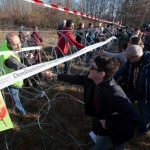ZAGREB, February 20, 2018 – Currently between 40,000 and 50,000 refugees from Afro-Asian countries are staying in the territory between Greece and the border with Croatia, trying to reach Western Europe, however, there are no signs that the migrant crisis of 2015 and 2016 could happen again with the same intensity that shook Europe, representatives of the UN High Commissioner for Refugees (UNHCR) and the International Organisation for Migrations (IOM) said in Sarajevo on Tuesday.
Anne-Christine Erikson, UNHCR’s representative for Southeast Europe, told reporters that the crisis was under control because the attitude of the Turkish government to refugees, notably those from Syria, had changed significantly, and the international community, too, was demonstrating a clear readiness to help the countries where refugees were currently staying.
She recalled that in 2016, too, when the so-called Balkan route across Croatia and Slovenia was closed, there was concern that other routes for mass refugee movement would be opened, yet that did not happen.
It is a fact that in the meantime some alternative routes have been opened, for example, across Albania and Montenegro to Bosnia and Herzegovina, and they have been used by smaller groups of refugees. This has resulted in an increase in asylum requests in Bosnia and Herzegovina, but on the other hand, the situation in Serbia and Macedonia is stable, said Erikson.
In 2017, police in Bosnia and Herzegovina caught 913 migrants while trying to enter the country illegally. This is an increase of 380% compared to 2016, when only 240 such cases were reported.
Last year, 376 asylum seekers were registered, an increase of 475% from 2016. In the period from January to mid-February this year alone, 77 asylum requests were reported, which indicates that the increase in the number of asylum requests will be even more significant by the end of the year.
It is still too early to talk about a new Balkan route, Bosnian authorities are trying to respond to those challenges and UNHCR is assisting them, said Erikson. Despite the challenges, it is very important for the government to keep the borders open to asylum seekers as it proves readiness to respect and protect basic human rights, she said.
Peter van der Auweraert, IOM’s regional coordinator for the Western Balkans, said that Bosnia and Herzegovina had been faced with a larger influx of refugees in the past and that the current crisis should therefore not be dramatised despite the increase in the number of migrants entering the country. One simply needs to adapt to the situation, he said.
He commended the local police for their treatment of migrants, stressing that it was considerably different from the police treatment of migrants in other countries, where police did not have much understanding for refugees.
Auweraert warned about the problem of criminal groups, citing in that context Montenegro, where refugee smuggling goes hand in hand with drug trafficking, as well as about the fact that among refugees there was a large number of single men who, unlike children or families, did not enjoy much sympathy and were often viewed with prejudice as potential trouble makers.
He noted that he was confident that numerous young men from Algeria or Morocco suffered and had problems and should be helped, adding that Bosnia and Herzegovina was not their final destination and that they wanted to continue their journey to Croatia and other EU countries.
This is not a problem which only Bosnia and Herzegovina should be dealing with, it should be dealt with by all Western Balkan countries and the entire EU. We have to find a solution for the Western Balkans as a whole, Auweraert said.
He believes that there will be no new mass arrivals of refugees to Bosnia and Herzegovina and Croatia’s borders this spring and that the situation that happened in 2015 and 2016 will not happen again.








